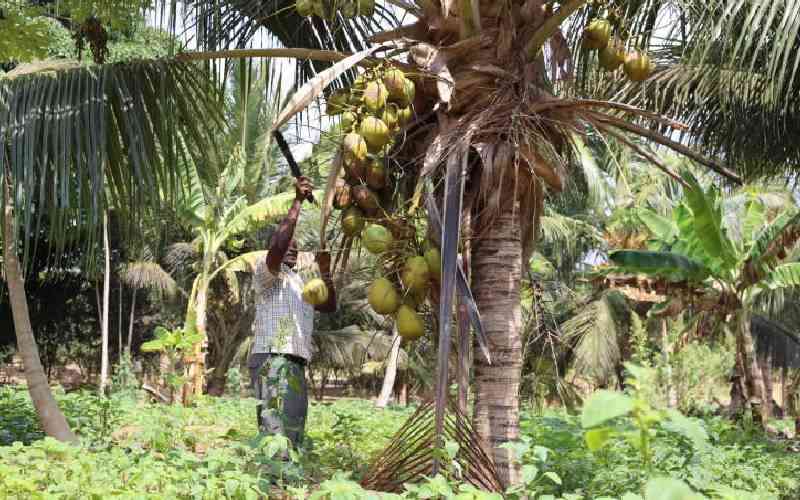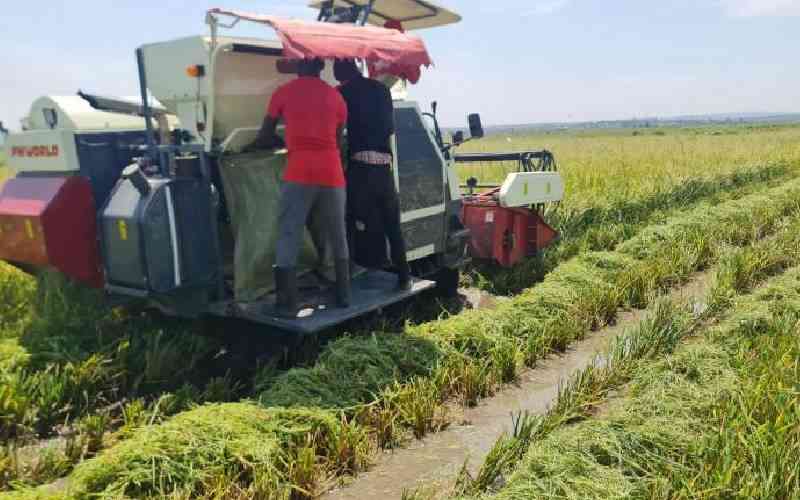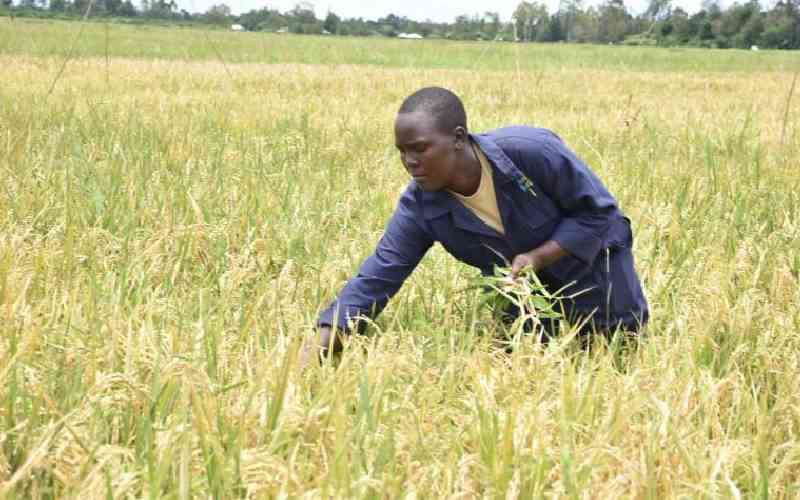 |
|
Francis Ndolo on his farm in Landless estate, Kiambu County. He makes a huge income from urban farming. (Photo:James Wanzala/Standard) |
Many residents living in towns and cities are turning to urban farming to fight poverty, enhance food security and improve environmental sustainability. Like many trying out the activity, Major Rt. Rev Francis Mutua Ndolo, 65, is already making a fortune out of it. He says urban farming is becoming a solution to earning a decent living.
The father of two, who lives in Thika’s gated Landless Estate, off Thika-Garisa Road, says that he has planted spinach on an eighth of his land, thanks to Real Impact, a non-governmental organisation (NGO) working to increase food security and improve nutritional health across East Africa.
The NGO delivers modern and sustainable agricultural practice and nutrition by helping communities understand the principles of good nutrition by championing the concept of vertical farming.
The technology allows growing of crops in large, bag-gardens, enabling farmers to grow vegetables such as sukuma wiki, spinach and amaranth on one square metre.
High-yielding
Bag gardening is an inexpensive but high-yielding food security technology developed by Real Impact, as it maximises land and water use.
They are efficient for schools, hospitals, informal settlements and on small-scale farms. The NGO is based on Kichozi Farm in Thika, Kiambu County where it has a 2.5 hectare demonstration farm and a training kitchen.
After retiring from service in 1985, Ndolo initially tried to venture into poultry farming. His 12,000 broilers died of disease in 1997 and left him desolate. But in October, while watching TV one evening, he saw a demonstration of vertical bag gardening.
“I took the contacts of the advertisers and got in touch. What interested me is that the sacks can be useful for up to seven to ten years if well-kept unlike the normal sisal sacks which rot fast,” says Ndolo who is also a musician and an author.
He pooled capital of Sh300,000 and bought 97 large size bags at a cost of Sh1,100 each, a total of Sh120,000.
The large size vertical bags have holes in them where stem seedlings are planted. They come in small medium and large sizes. He first decided to plant tomatoes in ten bags but they all died due to bad seeds.
He resorted to planting spinach only, thanks to its fast maturity period of one month.
Eight months later, Ndolo is a happy farmer with leafy spinach in his compound and he says in one day, he makes Sh2,000 selling spinach to neighbours. “If I sell to the market, I make Sh3,000. This translates to about Sh100,000 per month and after deducting expenses, I remain with not less than Sh60,000,” says Ndolo.
Ndolo sells 15 leaves at Sh10. He does not just plant and sell but also acts as an agent for the NGO to procure bags and liquid fertiliser to use as training materials for interested farmers.
He spends some cash on buying soil, liquid fertiliser and farm manure. “One good thing with the bags is that they minimise land use. If I would have planted on land, I would have tilled about half an acre but thanks to these bags, I farm on just one eighth,” Ndolo told Business Beat.
Stay informed. Subscribe to our newsletter
Ndolo advises urban dwellers to utilise space by trying sack farming. “It will help you save the cost of buying vegetables from mama mbogas and supermarkets. I also advise youths to take advantage of this technology to be financially dependent and create jobs,” he concludes.
[email protected]
 The Standard Group Plc is a
multi-media organization with investments in media platforms spanning newspaper
print operations, television, radio broadcasting, digital and online services. The
Standard Group is recognized as a leading multi-media house in Kenya with a key
influence in matters of national and international interest.
The Standard Group Plc is a
multi-media organization with investments in media platforms spanning newspaper
print operations, television, radio broadcasting, digital and online services. The
Standard Group is recognized as a leading multi-media house in Kenya with a key
influence in matters of national and international interest.
 The Standard Group Plc is a
multi-media organization with investments in media platforms spanning newspaper
print operations, television, radio broadcasting, digital and online services. The
Standard Group is recognized as a leading multi-media house in Kenya with a key
influence in matters of national and international interest.
The Standard Group Plc is a
multi-media organization with investments in media platforms spanning newspaper
print operations, television, radio broadcasting, digital and online services. The
Standard Group is recognized as a leading multi-media house in Kenya with a key
influence in matters of national and international interest.









